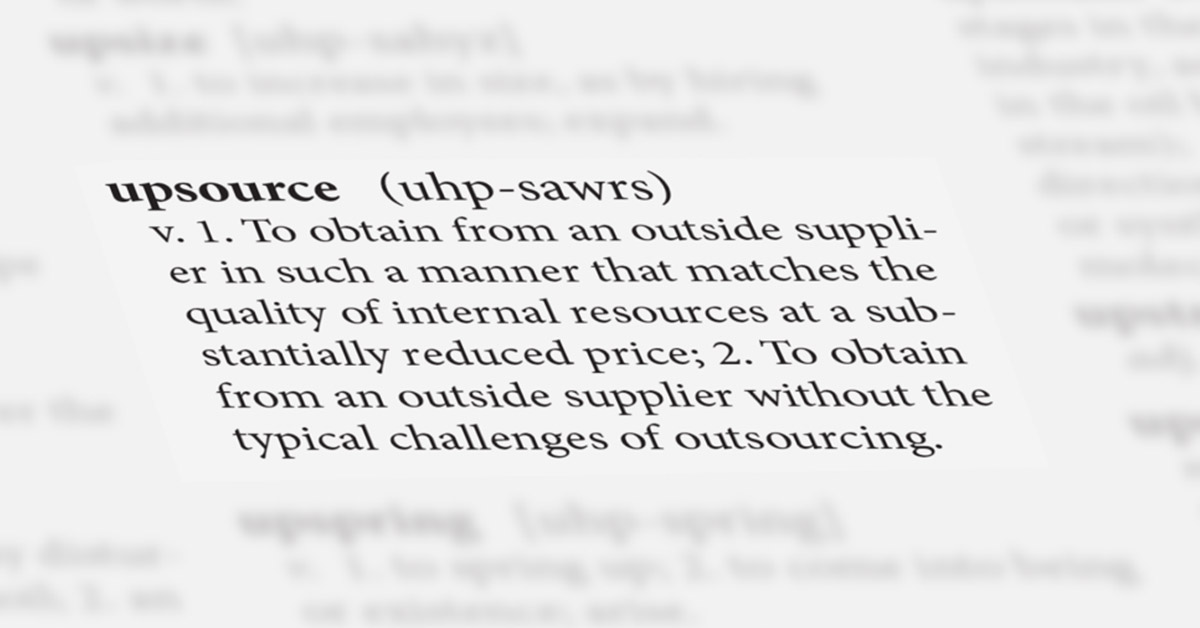CTOs and VPs of Engineering – especially those at smaller firms – likely feel overwhelmed when evaluating potential outsourcers. The outsourcing market is more than $90 billion annually, and there are literally hundreds of thousands of firms and millions of individual developers from which to choose. Even the process of creating a methodology to group vendors and assess their skills can be a daunting task.
Firms searching for outsourcing partners typically share the common objective of augmenting their internal development team at a reduced cost in order to complete development of product functionality considered to be “non-core” (that which does not include the firm’s intellectual property), and doing this while maintaining the “product culture” they’ve worked hard to create.
In this post, we will categorize outsourcers and introduce you to the concept of upsourcing, which is a new kind of professional software development service.
Read more: Reasons to Outsource Your App Ideas
Grouping Outsourcers
One of the first methods to screen potential outsourcers is to group them into logical buckets to ensure that the profile of the vendor matches your ideal partner. The groups below reflect those that small product development firms most often consider and ultimately hire.
Mega-Vendors
The largest software development firms employ thousands of software developers, testers, project managers and requirements/business analysts and promise highly refined development processes that produce consistent, reasonably high-quality results. Leading firms in virtually every major offshore development locale including India, China, Eastern Europe, South America, Vietnam.
These firms are ideal for large corporations with substantial project budgets and extended timelines. They can handle engagements that require heavy processes and long ramp-up periods. Although these vendors support companies aiming to augment internal resources for the long term, hiring firms often face challenges in integrating teams from large firms seamlessly. This integration struggle can negatively affect the hiring firm’s desired “product culture”.
Low-Cost Players
This category unfortunately includes the largest quantity of development firms and has ultimately resulted in a negative connotation of the word “outsourcer” because it has become synonymous with offshore, low cost, and low quality that these firms produce. Virtually every software development executive has at least one offshore outsourcing nightmare story and these firms are the culprit.
Bottom feeders focus on hiring the cheapest personnel in their country, typically recruiting either inexperienced college graduates or those overlooked by higher-quality firms. They provide minimal training before assigning developers to projects. Moreover, they experience high turnover due to low compensation, fostering a “short-term” cultural mentality.
The result is that the teams assigned to their clients lack of a sense of ownership of the ultimate success of their work and focus more on achieving client acceptance than on software architecture, design, and code quality.
When pitching, these firms promise extremely low prices, often under $3,000 per developer per month. They offer immediate project start-up and a wide range of skills across various platforms and technologies, along with unrealistic deadlines. However, these promises seldom materialize. The saying “you get what you pay for” is particularly true in software development. Cost savings on outsourcing may lead to future expenses, whether through missed deadlines causing budget overruns, the need for code refactoring, or low customer satisfaction due to the release of a subpar product. In almost all cases, choosing a bottom feeder turns out to be an unwise decision.
Freelancers
Using services such as Upwork (formerly Elance and Odesk), Freelancer, or Guru, millions of software developers in countries around the world hang out their digital shingle to find jobs and advertise attractive hourly rates. While many of these people have solid training and skills, a hiring firm needing to build a team typically finds the following challenges trying to turn a collection of individuals into a team:
- Poor understanding of and less experience using the agile development methodology likely used by the hiring firm.
- Management challenges including communication, quality assurance controls, and design/architecture oversight, which ultimately result in design flaws and code quality problems.
- No integrated quality control processes or personnel. The code is written and committed and the hiring firm is responsible for ensuring that the code works correctly.
Freelancers are effective up to a certain point. The work of one or two individuals can be manageable, with acceptable quality and a suitable “product culture”. However, this option rarely scales beyond a couple of developers. For discrete projects like building a basic website, which a single developer can handle, hiring one freelancer is ideal. But, when a firm needs to form a team, gathering individual freelancers often leads to more problems than solutions. A team is more than just a group of individuals.
Premium, Boutique Vendors – “Upsourcers”
When a hiring firm’s resource needs exceed what individual freelancers can manage, turning to a premium offshore development partner becomes the best option. These firms prioritize delivering high-quality software. Typically, an expat or a U.S.-based executive, who has spent years working with the overseas organization, leads these companies. Their main responsibility is to forge strong relationships with the leadership and preserve the culture essential for high-quality delivery.
These offshore firms usually have a staff count of fewer than 100 personnel.
Their smaller size enables sustained high quality, thanks to senior management’s close relationships across all organizational levels. As they grow slowly, client by client, they add senior project and technical management personnel, plus human resources staff. These additions, though non-billable, are crucial for preserving the culture, quality of personnel, and efficient processes that were key to their success as smaller entities.
This level of quality comes with an increased price over freelancers and bottom feeders. Premium vendors may cost between 30 to 50 percent of hiring internal personnel in the United States.
Upsourcing – the cost-efficient deployment of executive level, hands-on external resources in lean, custom teams designed specifically to deliver the highest value outcome for critical business needs.
When you engage with a premium firm, expect to find the following:
- A vendor that wants a long-term engagement. This entails the vendor hiring personnel for a “job”, not a “project,” and finding people with a long-term perspective on their work;
- Personnel who take a personal sense of ownership for their work that you would expect to find in an employee;
- A team that embraces your product culture and ultimately becomes a seamless extension of your company;
- Management and a team offer bundled consulting. This consulting provides insights and advice to improve your product and development processes. As a long-term partner, the vendor aims to ensure your maximum success.
- A firm that builds a team specific to your needs while pre-screening candidates to meet their technical and cultural requirements so that you are able to participate in shaping the team just as you would if you hired personnel internally.
If you are able to engage with a firm that delivers these attributes, you’ve found a “upsourcer”, not an outsourcer. This is an organization that can:
- Scale as your company grows;
- Be a seamless extension of your internal team and product culture;
- Deliver high-quality software at a fraction of the cost of US-based staff;
- Make your organization more productive and efficient with bundled processes and product consulting.
Consider CodeStringers for your Upsourcing needs.






